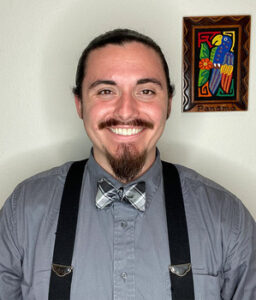Jason M Maher, a master of public health student, received his bachelor’s degree in music from Duke University. As an undergraduate, he was active in the Duke Symphony Orchestra, Duke Chamber Players, and Duke Afro-Cuban Percussion Ensemble, among other groups. A year after graduating, he was invited to serve in the U.S. Peace Corps, where he had numerous roles in three-plus years of work in Cameroon. His most recent work focused on “HIV/AIDS prevention and mitigation efforts prioritizing adolescent girls and young women as they are consistently the demographic that experiences the greatest number of new HIV infections each year internationally.”
What made you choose UNC-Chapel Hill when deciding on a program/place to study?

As a Blue Devil with a bachelor’s degree from the one and only Duke University, my journey to become a Tar Heel has certainly been a powerful one. I came to choose UNC-Chapel Hill for my graduate studies for a variety of reasons. Initially, the name came up from a Gillings alumnus with whom I had scheduled an informational interview while I was serving in the U.S. Peace Corps in West-Central Africa. His enthusiasm about the program was certainly backed by the school’s remarkable reputation in public health rankings and the international community. After that brief exposure, I completed an extension of my service with the SOS Children’s Villages in Cameroon and intended to bolster my experience with the academic perspective we associate with graduate programs. My partner was aware that I was looking only at residential programs (as this was just a month or two prior to the COVID-19 pandemic pushing many programs online/virtually) and left my contact information in the “I would like to learn more” section of the Gillings Master of Public Health page. It must have been the very next day I received a call from a spectacular admissions counselor who immediately took it upon herself to link me with all the right people within Gillings to show me that the online MPH@UNC program was where I should call home. This unwavering support throughout the admissions process has only been amplified throughout my first year of studies. Advisors and faculty have been incredibly supportive and understanding that I wish to remain working in the field while I complete my studies. I must say I often recommend this program to my peers/colleagues in public health.
Tell us about your research.
My recent projects and work experience have been on the implementation side of things. I have worked closely with non-governmental organizations in Cameroon as a program officer for HIV prevention, effectively consulting to establish a framework within their organizations for HIV/AIDS prevention and mitigation efforts prioritizing adolescent girls and young women as they are consistently the demographic that experiences the greatest number of new HIV infections each year internationally. My work has involved project design, development, planning, intervention, monitoring, reporting, and evaluation to build capacity with host country nationals to ensure the sustainability of these behavior change communication practices. I have aided in the development of community programs ranging from HIV testing campaigns to gender-based violence prevention workshops.
How have you built community as a graduate student at Carolina?
As a remote student, I certainly didn’t want to miss out on the student life aspect of being a graduate school Tar Heel! What may perhaps be considered a silver lining of this “academia in the times of
COVID” is that all of UNC’s coursework went remote in my second term. This pushed student organizations and even IME into more remote and virtual programming. This has allowed me to step up in roles to assist with programming for student groups including the Brotherhood of Success and La Familia. I have felt that offering my perspective as a remote student has certainly helped to merge this gap between the lives of residential and online students.
What are you hoping to accomplish with your Carolina degree?
My Carolina degree will absolutely help me to get right back in the field and keep working on projects and programs across the globe. The world-class education offered by the Gillings School of Global Public Health is recognized widely and ranked at the very top in international circles. I hope to take the various connections I’ve made as a Tar Heel to help leverage my network to effect positive public health outcomes on the international stage.
